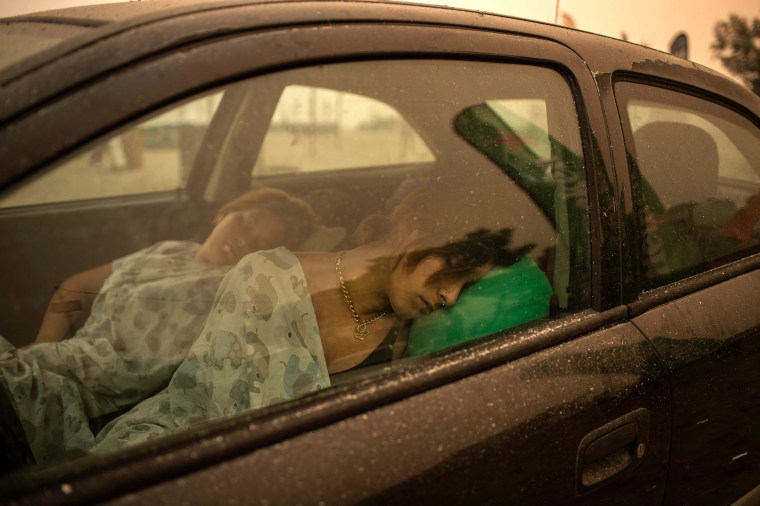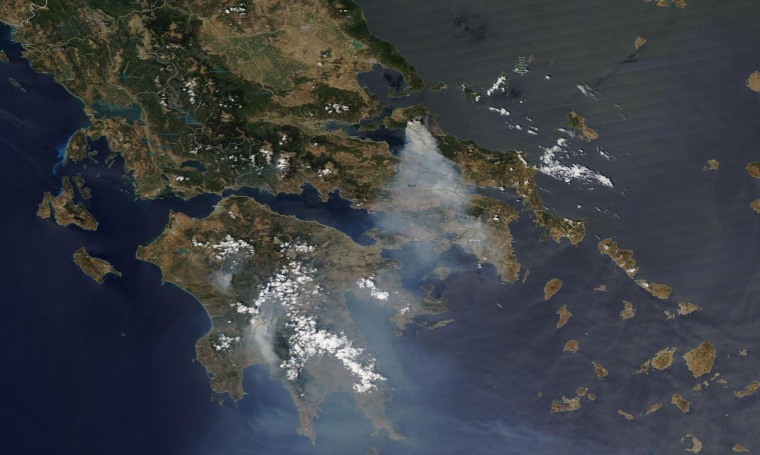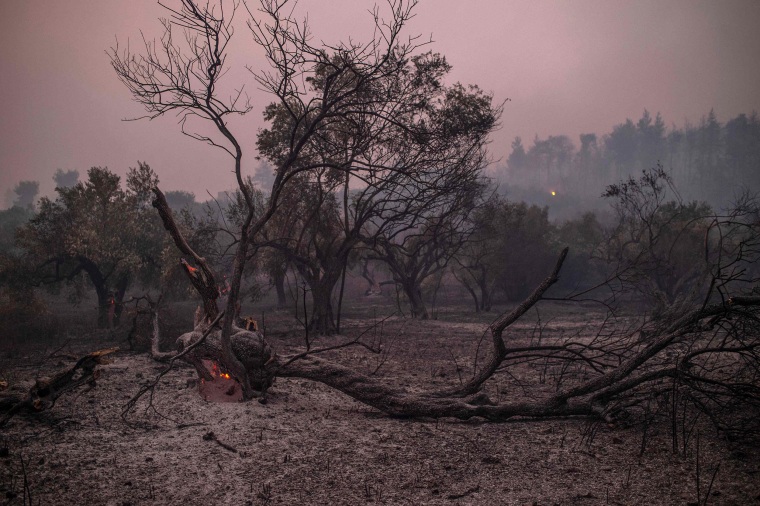Wildfires raging across Greece's second largest island for a seventh day, forcing thousands to flee their homes, are the direct result of climate change, a global consortium of weather and climate experts said on Monday.
The Greek coastguard has evacuated more than 2,000 people from Evia, a popular vacation destination northeast of Athens, since fires broke out there last Tuesday, a spokesperson told the Associated Press.
Firefighters from more than 20 European countries are on Evia to help authorities stop the progress of the fires, which are destroying acres of tinder-dry forests and some homes.

The World Meteorological Organization said that the fires, which have blocked out the sun amid the hottest weather Greece has seen for 30 years, are part of a chain of extreme weather caused by climate change as a result of human behavior.
Its secretary-general, Prof. Petteri Taalas, released a statement after the U.N. Intergovernmental Panel on Climate Change (IPCC) released a landmark report warning that climate change was accelerating and in some ways irreversible.
Download the NBC News app for breaking news and politics
"The harsh reality of climate change is playing out in real time before our very eyes," said Taalas.
"It is a foretaste of what faces future generations. Some of the negative changes are already locked into the climate system but others still can be addressed if we make strong, rapid and sustained reductions in emissions now."
Temperatures have reached 45 degrees Celsius (113 Fahrenheit) across Greece for the last few days. Other big fires have been burning forests and farmland in the southern Greek region of the Peloponnese, while a major blaze that burned through homes, businesses and forests on the northern fringes of Athens was on the wane, authorities there said.
Fires have also been raging in neighboring Turkey for the last 10 days.

The IPPC's report predicts long-term temperatures will rise across the globe, with a rise of 1.5 degrees Celsius (2.7 Fahrenheit) enough to trigger more heatwaves, floods and droughts. A rise of 2 degrees (3.6 Fahrenheit) could see agricultural and health systems fail across the world, the report said.
Taalas was in no doubt that extreme weather events and fires in Europe and across the world were connected.
"The extreme heat we have witnessed in 2021 bears all the hallmarks of human-induced climate change... Fires in North America stoked by heat and drought have sent plumes of smoke across the Atlantic," he said.
"In recent days, we have seen devastating fires in Turkey and Greece amid an intense and long-lasting heatwave in the Mediterranean. Siberia — a region traditionally associated with permafrost — has once again seen huge wildfires after exceptional heatwaves, fires and low Arctic sea ice in 2020."

The WMO, a U.N. agency based in Geneva, Switzerland, established the IPCC alongside the U.N Environment Programme in 1988.
For some on Evia, international assistance may be in vain. "It’s already too late, the area has been destroyed," Giannis Kontzias, mayor of the northern Evia municipality of Istiaia, told Greece’s Open TV Sunday night.
In dramatic scenes Sunday afternoon, fast-moving flames encroached on the seaside village of Pefki on the island's northern coast, burning trees on the fringes and setting at least one house on fire, the Associated Press reported. Panicked residents raced with water tanks, hoses and branches in a seemingly futile effort to extinguish the flames.
CORRECTION: (Aug. 10, 2021, 08:41 a.m. ET) A previous version of this article misstated the conversion of a 1.5 degree rise from Celsius into Fahrenheit. The increase is equivalent to a rise of 2.7 degrees Fahrenheit, not 34.7 degrees, which is a conversion of 1.5 Celsius as a temperature.
